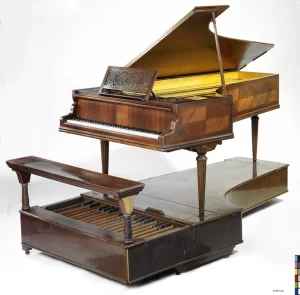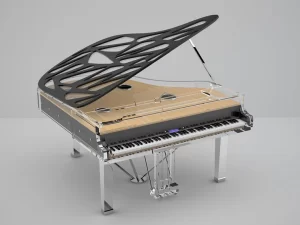Uncategorized
Practising on a Digital piano or an Acoustic piano?
Practising on a Digital piano or an Acoustic piano?
Keyboard vs Piano?
Digital pianos vs Accoustic pianos?
best electric piano uk
INTRODUCTION
Many things have been said about practising on a digital piano.
Old school piano teachers state that piano students should never practise in digital pianos because it can ruin their sense of tone. They also say it can also affect the way they project the sound and how they manage textures.
In reality, there is hardly anything written about the disadvantages of studying on a digital piano. Seemingly, the good old maestros are too busy playing the piano or teaching and find no time to write about this matter.
I was taught by one of the XXth century’s best pianists, Bruno Leonardo Gelber. He studied with one of the most traditional and prestigious piano maestros of the beginning of the XXth century: Vicente Scaramuzza. He was, obviously, practising on an acoustic piano. But, the truth be said, a lot of professional pianists like Bruno Leonardo Gelber turned into practising digital pianos.
Practising on a Digital piano or an Acoustic piano?
There are several hypotheses on why studying on a digital piano can end being quite positive for us. I will list four of them:
1. Fosters the use of our sound-imagination
Bear in mind: regardless of how good a digital piano is, it will never sound like a real one. That could be understood as a disadvantage; but, is it actually a disadvantage? Not really…
Digital pianos provide us with a clear and neutral sound. It is true: the sound of a digital piano is not particularly alluring; nevertheless, it is very precise. We, performers, face the challenge of creating a well-crafted version of the piece we intend to play. This abstract audio-mental-image is what we “picture” when we perform. Without this abstract object in mind, we cannot perfect our version of a piece; mainly because there is no version as such to follow or recreate. Practising on a digital piano doesn’t go against the creation of this abstract device, on the contrary, it provides the perfect neutral tool to reinforce it.
The natural timbre of the acoustic piano is truly inspiring but: Is this always an advantage? Not necessarily… While it is fabulous to experiment what we have planned for a piece on an acoustic piano, the complexity of sound we obtain from the acoustic can end being a bit confusing.
2. Practicing on a digital piano is less harsh for our ears
Practising the piano for very long hours can prove to be harassing for our auditory system. Digital pianos offer us the chance to lower the volume while we practise. This can help us to protect our ears from the unnecessary strain of practising long hours on a powerful grand piano. It can also help us endure practising more attentively.
3. It never needs tuning
Practising on an out-of-tune instrument can end confusing us, particularly if we have perfect pitch. An electric piano for beginners -or advanced students- guarantees we will not encounter this problem. It is also very helpful if we do chamber music.
4. It encourages us to practice without pedal
One of the disadvantages of practising on an acoustic piano is the constant temptation we feel to use the pedal. This wonderful embellishing tool can have the exact opposite effect on our performance. A digital one is the best “starter” piano because studying without a pedal helps us developing our legato touch much better than any other technical exercise.
It helps us train our own action without adapting so much to the piano we use.
A lighter and rather flat piano action helps us focus more on our own body weight while practising. Having to change the instrument for the real concert performance is one of the pianists’ biggest challenge.
Practising on a digital piano can contribute to overcoming this difficulty. The instrument can be so different to a real piano that can keep us away from trying to adapt to it too much. We know a real acoustic piano will propose us a completely different technical challenge. With the later in mind, we can focus on projecting the image we have built of the piece on our mind. We can practise very long hours, we can concentrate on perfecting our technique and we can explore our colour pallet without damaging the instrument whatsoever. Practising on a digital is for pianists as going to the gym is for athletes.
LIST OF THE BEST DIGITAL PIANOS IN THE MARKET
KAWAI CA67
This digital piano is indeed the best digital instrument on the market, with a very professional piano sound. It is possibly the most responsive instrument available and it counts with an emulated GRAND PIANO ACTION. Besides, it has a great selection of additional sounds like organs, strings, synth pads, choirs and electric pianos. Of course, it has all the technology available for a better play and study experience: you can record yourself, use a metronome, plug in USB devices and more. All of this makes it the best piano for beginners, adults and children.
KAWAI CN23
The Kawai CN23 it’s a very good piano keyboard for beginners. It was build to emulate the Kawai’s hand-built concert grand piano, with all is 88 keys recorded, analysed, and reproduced using the latest technology of the company. It also allows students to learn the piano using a built-in collection of etudes from Czerny, Burgmüller and Beyer, or songs from the popular Alfred Basic, Adult and Premier course books. You can practise separately the right and left hand, adjust the tempo to them and record to listen to it later.
DP-10X DIGITAL PIANO
The touch sensitivity of the keys can be adjusted to suit any playing style: it as the three traditional piano pedals, a panel that provides connectors for power and audio IN and OUT and a build-in sound system, providing a sound really similar to an acoustic piano, which makes it a great keyboard piano for beginners too.
AXUS 2D DIGITAL PIANO
The AXUS 2D has some great features, specially designed for beginners. Like the Kawai’s, it replicates the feeling and sound of a grand piano, has 3 piano pedals -soft, sostenuto, sustain-, headphone input, recorder and metronome. The Axus digital piano includes a Master Tune, Transpose function, reverb and chorus effects.
You can find anyone of these digital pianos in London easily, or you can order them online from different shops.
digital pianos London – digital piano London – acoustic pianos in London – digital piano for beginners
Read our guide on how to buy a piano, in which we differentiate qualities and options between digital, acoustic and grand pianos.
We hope we helped you with questions: Practising on a Digital piano or an Acoustic piano?



